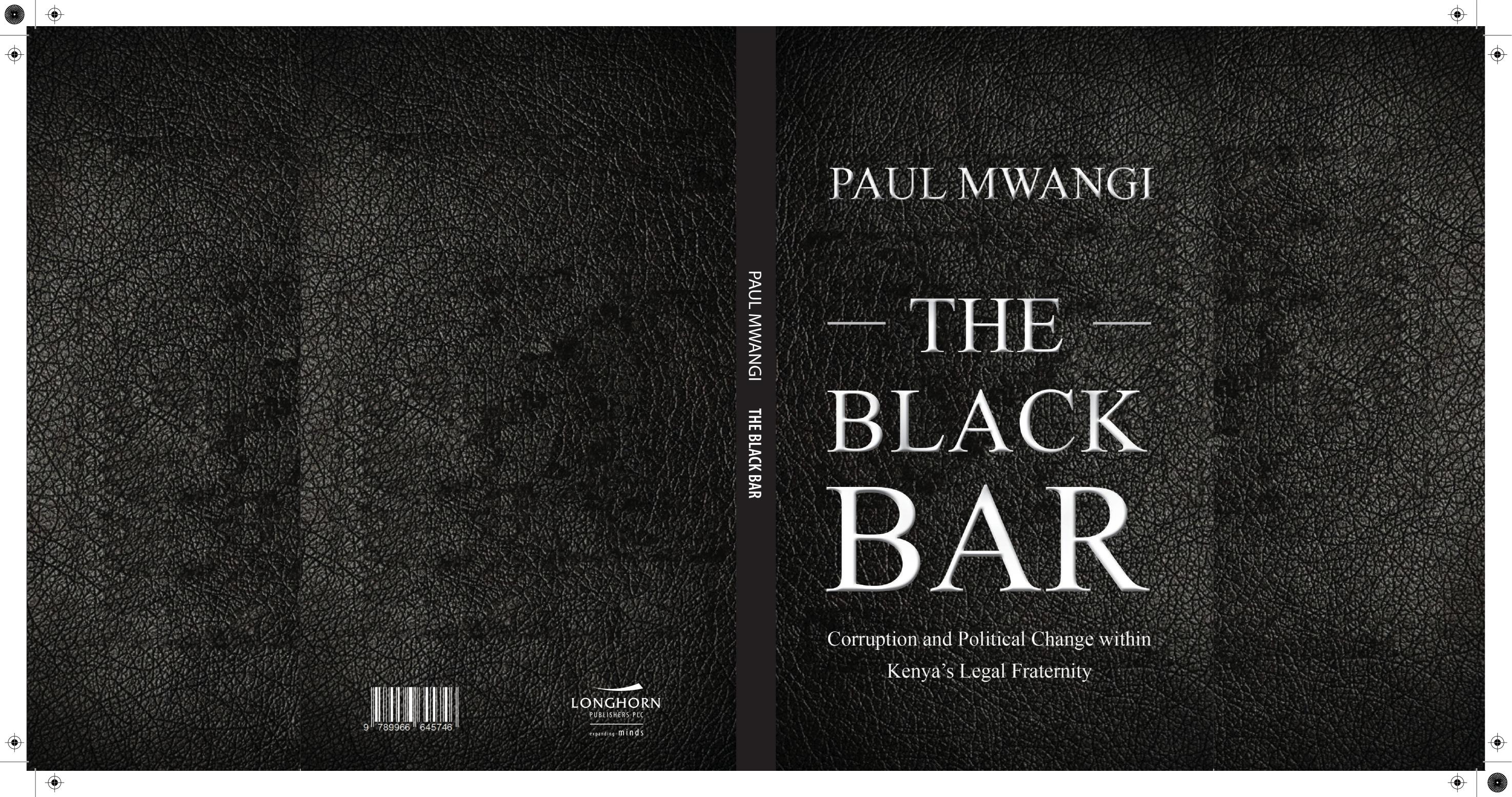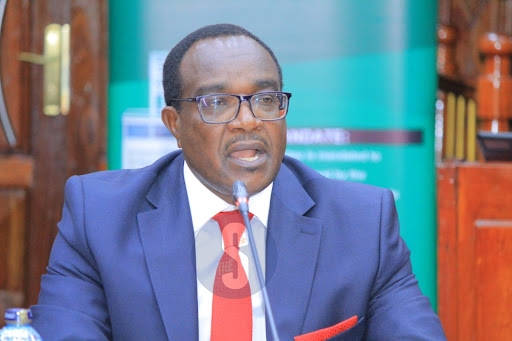
 Book cover / COURTESY
Book cover / COURTESY
The 1990s was a watershed period for the battle for the soul of the Law Society of Kenya.
According to Paul Mwangi’s ‘The Black Bar: Corruption and Political Change within Kenya’s Legal Fraternity’, first published in 2001 and reprinted this year, the legal profession endured hell from the hands of then-President Daniel Moi’s Kanu administration.
Here are excerpts from the book.
The Final Conflict
Chapter 10
At the end of 1989, the government had contained opposition from all the sectors of the country. It managed to keep all these sectors under tight control, with the exception of the Law Society of Kenya and the National Council of Churches in Kenya (NCCK). Although the government had managed to contain the counter- action from these two institutions, it could not manipulate them like it did other institutions.
What President Moi wanted was “total” control. He was paranoid about dissent and the remotest possibility of opposition activated him into extreme action. However, his system of “reward and punishment” which had successfully won over the universities and trade unions was not successful with the church and the Bar. The church was uncontrollable due to Moi’s own mistake. In 1978, he had won the support of the majority of the country’s population by portraying himself as a God-fearing person. He attended church services every Sunday, which were largely covered by the entire public media. He was a guest in every religious ceremony of every religion or denomination. For a country where almost every citizen follows a form of religious persuasion, Moi became a messiah of sorts. When the religious leaders began to question his rule, Moi could not discredit them without alienating the populace.
Not just because, unlike other sectors, Moi could not install himself as a leader in the churches. (Elsewhere he was the leading farmer, or worker, or trade unionist etc. His voice presided over that of all other leaders in the relevant sector.) In the church, the clergy were not replaceable by a layman, even by one who had befriended the 200-odd competing religious denominations in Kenya.
Moi’s inability to discredit the religious leaders was also due to their public standing. They did not have any political ambitions and every criticism from them was objective. They never faced the danger, which befell the LSK, of being accused of ulterior motives or treasonable objectives. Neither did they face the danger of being called liars. Not even Moi in his customary effrontery could dare accuse the clergy of dishonesty; not before Kenyans
The most he could get away with was to criticise the largest conglomeration of churches, the NCCK. That way, he never risked offending a specific religious grouping. In some cases, he would single out a particular clergyman for criticism. For instance, the Presbyterian Church of East Africa (PCEA) clergymen were some of the most vocal critics of his government, but he never engaged the PCEA head-on. Instead, he would single out a particular clergyman (his most favourite was Rev. Dr. Timothy Njoya) for rebuke.
The NCCK gained prominence as a shield for the churches when they discussed issues directly attacking Moi. It granted comfort and security for churches and clergymen who used the NCCK as a podium to address President Moi. They knew that the President was wary of the possibility that the Council would act in concert to protect one of their own, by enrolling mass support for themselves.
The position of the Bar, however, was very different. Moi had managed to turn public sentiment against lawyers. But the lawyers had a greater influence on international policy towards Kenya than the churches. Unlike clergymen, lawyers have a stronger bond of fraternity that cuts across borders. The attack on a lawyer, however insignificant, is an affront against the entire fraternity internationally. It is an invitation for numerous letters of protest from all corners of the globe.
The interpretation of the attack is a more grievous consequence. The attack of a lawyer is a confession by the government that it has absolutely no regard for the rule of law. Police entry into a lawyer’s office is sacrilegious. A government can explain, with a fair measure of apparent credibility, high-handed action against a journalist or a clergyman—never a lawyer.
The LSK therefore remained a thorn in Moi’s flesh. The lawyers could act individually or in concert, and still attract international attention either way. Luckily for the President, his show of force against a few lawyers and numerous non-lawyer critics had left the individual lawyer very shaken. The average LSK member was intimidated. Only a handful were ready to risk their lives fighting autocracy. The rest threw their weight behind the LSK Council hoping it would say what they feared to state as individuals.
At the beginning of the 1990s, the sole human rights publication in Kenya, The Nairobi Law Monthly, reported: “Since the Kenya Parliament amended Kenya’s Constitution in 1982 and entrenched KANU as the sole lawful political organization in Kenya, the National Council of Churches in Kenya (NCCK) and the Law Society of Kenya (LSK) have been accused by politicians of having assumed the role of an ‘unofficial opposition party’. The reason for this is that the two organizations have been consistent in speaking out on issues that the government and Members of Parliament claim to be their special preserve as representatives of public opinion.”
Despite the advantage of international standing that the LSK had over the NCCK, it operated under one pitiful vulnerability; it was susceptible to penetration by the politicians. It was a weakness Moi had identified as early as 1986 and one that he began to make use of. His intention was to alter the 170 composition and leadership of the LSK and subsequently use it to further his political ambitions.
Changing the composition of the LSK could only be done by interfering with the admission of students to the Faculty of Law of the University of Nairobi, the only source of legal education in Kenya. Historically, entry into the Faculty of Law was difficult. The Faculty boasted the highest cut-off points for applicants and, with only one hundred places available, comprised the best students in Kenya.
In 1986, Moi imposed a policy on the University under which a particular number of students from “marginalised” areas had to be admitted to the Law Faculty regardless of their performance in high school. The rationale given for the policy was that without some drastic measures in affirmative action, the under-developed tribes in Kenya would never participate in the economic activities in the country. In practice, the policy would promote the under-developed tribes at the expense of the academic standards of the university. For that reason, the move was widely resented. Further, the policy was used to pump into the Law Faculty students’ tribes considered loyal to Moi’s regime. Some of these students had not scored the required grades and a few, it was said, had not qualified to be at the university at all.
Once at the university, the students were organised into a lodge that was patronised by the President. Under the auspices of the lodge, they consulted with the President and with other political leaders close to him. During the consultations, the students were wined, dined and indoctrinated. They were made to view themselves as parties to inter-class rivalry whereby the critical lawyers were members of privileged tribes who wanted to maintain the status quo at the expense of the smaller tribes.
By enrolling an increasing number of indoctrinated Kalenjin students into the Faculty of Law, Moi stood to gain control of the LSK. In just a few years, the LSK would have been invaded by a die-hard pro-government faction that would neutralise the critical crusaders. And even though the new apologists would take time before they achieved a ruling majority in the society, they could counter the critical bar often and effectively enough to shake its credibility. Pitifully, most of the new students lacked the necessary brilliance to become indomitable crusaders and the requisite dexterity to pass their Bar exams. In the first year, 90 per cent of their lot performed so dismally that the Faculty Board recommended some of them to re-sit their papers and others to repeat the year. The evening before the results were released, orders were issued that the students proceed to their second year. The Faculty Board was left to organise how that would happen.
The first gang of these “Moi youths” graduated, battered and incompetent. Though they had sailed through the course with no casualties, the strain had sobered their sycophancy and they left the University less confident about themselves. For one, though the Faculty Board was bound to pass them, it did no more than that and they thus accounted for the worst performance throughout the course. Secondly, they realised there was little they could do against the strong anti-Moi sentiments in the profession, such as was displayed in the February of 1990.
***
Readers can order and/or buy The Black Bar at:
1. Nuria Books
0794 233 261
2. LawAfrica
0723 413 744
3. Amazon
https://www.amazon.com/Black-Bar-Corruption-Political-Fraternity-ebook/dp/B0FL2H8BRZ/
4. Price of book - Sh1,500/-
© Paul Mwangi, 2025













